
What Are Intelligent Agents in AI? Explained in a Simple Way

Published on: October 11, 2023 Healthcare
Healthcare software development outsourcing involves healthcare organizations hiring external vendors or specialized companies to create and maintain software solutions for the healthcare industry. They delegate their software development tasks to these third-party providers. This helps healthcare organizations by giving them access to a wider range of skilled professionals, saving money, and allowing them to concentrate on their main tasks while specialized experts handle software development requirements.
When healthcare organizations outsource their software development, they can tap into a diverse group of experienced professionals who specialize in creating healthcare software solutions. These experts possess extensive knowledge about healthcare regulations and best practices, which guarantees that the software they develop fulfills the specific requirements of the industry. This enables healthcare organizations to leverage external expertise and focus on their core activities.
Moreover, outsourcing healthcare software development services often results in cost savings. By outsourcing, healthcare organizations can avoid the need to maintain an in-house software development team, which involves substantial investments in hiring, training, infrastructure, and ongoing operational expenses. Outsourcing allows organizations to leverage the expertise of external vendors while reducing overall expenses.

Outsourcing has witnessed growing importance in the healthcare industry due to several compelling reasons. One of the primary assets is the need for cost reduction and working efficiency. Healthcare organizations are constantly finding ways to optimize their resources and streamline processes to provide high-quality care while managing costs. When healthcare providers outsource non-core functions like administrative tasks, IT support, or revenue cycle management, they can benefit from external expertise and specialized services at a lower cost than if they were to maintain in-house teams.
Additionally, outsourcing in the healthcare industry allows organizations to access a vast pool of specialized talent and expertise. The healthcare sector requires a deep understanding of regulatory compliance, industry standards, and emerging technologies. Outsourcing partners typically have dedicated teams that possess extensive knowledge and experience in these areas. This allows healthcare organizations to take advantage of their specialized skills and valuable insights. This access to expertise helps healthcare providers navigate complex challenges, implement best practices, and stay ahead of industry trends.
Outsourcing also provides healthcare organizations with scalability and flexibility. The industry experiences fluctuations in demand, such as seasonal variations or sudden spikes in patient volumes. By outsourcing certain functions, healthcare providers can quickly adjust their resources and scale their operations up or down as needed. This flexibility enables healthcare organizations to effectively handle capacity, minimize wait times, and maintain a seamless workflow. As a result, it enhances patient satisfaction and improves outcomes.

Outsourcing healthcare software development presents significant cost savings and budget optimization opportunities for healthcare organizations. By partnering with external software development companies, healthcare providers can eliminate the expenses associated with maintaining an in-house development team. This includes costs related to recruitment, training, salaries, benefits, and infrastructure.
Outsourcing healthcare software development provides healthcare organizations with access to specialized skills and expertise. It requires a unique combination of software engineering knowledge and an understanding of the healthcare domain. By outsourcing, organizations can access a dedicated team of professionals who have extensive expertise in healthcare regulations, industry standards, and best practices.
Outsourcing healthcare software development enables healthcare organizations to achieve faster time-to-market for their solutions. In the competitive healthcare industry, speed is crucial for introducing innovative solutions and gaining a competitive edge. External software development companies have established processes, frameworks, and resources dedicated to speeding up development cycles.
The healthcare industry faces changes in demand caused by factors like seasonal variations, fluctuating patient volumes, or the introduction of new services or treatments. Outsourcing provides scalability and flexibility in resource allocation to effectively manage these fluctuations. Outsourcing healthcare software development provides scalability and flexibility in resource allocation.

It’s important to have a clear understanding of your company's specific software development needs, goals, and objectives. Define the project scope, desired outcomes, and timeline. A trusted outsourcing partner should have a strong commitment to understand your business needs and match their services accordingly. Look for a partner who demonstrates an approach to understanding your company's unique challenges and offers tailored solutions to meet your specific needs.
When evaluating an outsourcing partner, it is crucial to assess their experience and expertise in the healthcare industry. Look for a proven track record of successfully executing healthcare software development projects. Pay attention to their understanding of healthcare regulations, compliance requirements, and industry standards. Additionally, verify their experience in developing similar healthcare solutions like electronic health records (EHRs), healthcare analytics platforms, or remote healthcare applications.
Evaluate the outsourcing partner's technical capabilities and infrastructure. Review their technical expertise and proficiency in relevant programming languages, frameworks, and tools. Consider their ability to handle the specific technology stack required for your project. Assess the scalability and reliability of their infrastructure to ensure they can accommodate the demands of your software solution.
Compliance with quality standards and healthcare regulations is paramount in the healthcare industry. Make sure that the outsourcing partner maintains strict quality assurance practices and complies with recognized industry standards, such as ISO 9001 or CMMI. Assess their familiar understanding of healthcare regulatory frameworks, such as HIPAA or GDPR, and their ability to develop software solutions that meet the necessary compliance requirements. Consider the partner's approach to security, privacy, and data protection and their willingness to sign appropriate secrecy agreements and comply with legal obligations.
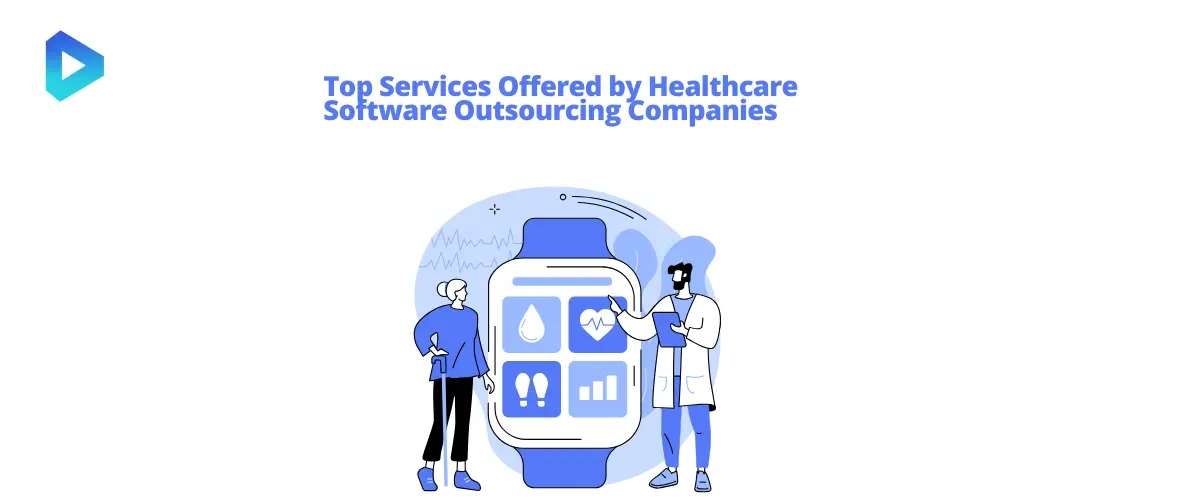
Healthcare software development outsourcing companies specialize in creating customized software solutions tailored to the unique needs of healthcare organizations. They build software applications from the ground up, taking into account the organization's requirements, workflows, and integration needs. Custom software development covers a wide range of solutions, such as practice management systems, patient portals, medical billing and coding software, and laboratory information management systems (LIMS).
Outsourcing companies specialize in providing mobile and web application development services tailored to healthcare organizations. They create user-friendly and responsive applications accessible on mobile devices and web browsers. These applications serve various purposes, including remote healthcare platforms, appointment scheduling, patient engagement tools, remote patient monitoring apps, and medication management systems. The emphasis in mobile and web application development lies in delivering intuitive interfaces, seamless user experiences, and ensuring secure data transmission.
Specialized outsourcing companies in healthcare software development play a crucial role in the development and integration of Electronic Health Record (EHR) systems. EHR systems digitize patient health records, improving care coordination and working efficiency in healthcare organizations. Outsourcing firms design EHR solutions that adhere to industry standards, compatibility requirements, and regulatory guidelines. These systems ensure secure storage, access, and exchange of patient data, streamline documentation processes, and contribute to improved patient care outcomes.
Outsourcing companies fulfill the increasing demand for telehealth and remote patient monitoring by developing and implementing these solutions for healthcare organizations. They create telehealth platforms that enable virtual consultations, video conferencing, remote diagnosis, and treatment planning. Additionally, they develop software and integrate devices to remotely collect and analyze patient health data.
Healthcare software development outsourcing companies offer valuable services in developing data analytics and business intelligence tools. With healthcare organizations generating substantial amounts of data, these tools enable them to gain valuable insights and make informed decisions. Outsourcing firms specialize in creating data analytics solutions that facilitate data analysis, visual representation, trend identification, and tracking of key performance indicators. These tools assist in evidence-based decision-making across different areas, such as population health management, revenue cycle analysis, clinical research, and quality improvement initiatives.
Healthcare organizations handle sensitive patient data and are prime targets for cybersecurity threats. Outsourcing companies offer cybersecurity and data privacy solutions to safeguard patient information and ensure compliance with regulatory requirements. This includes implementing robust security measures, conducting weakness assessments, developing secure verification systems, encrypting data, and implementing access controls. Outsourcing companies also help ensure compliance with healthcare data privacy regulations, such as HIPAA or GDPR. They offer ongoing monitoring and support to safeguard against potential breaches.
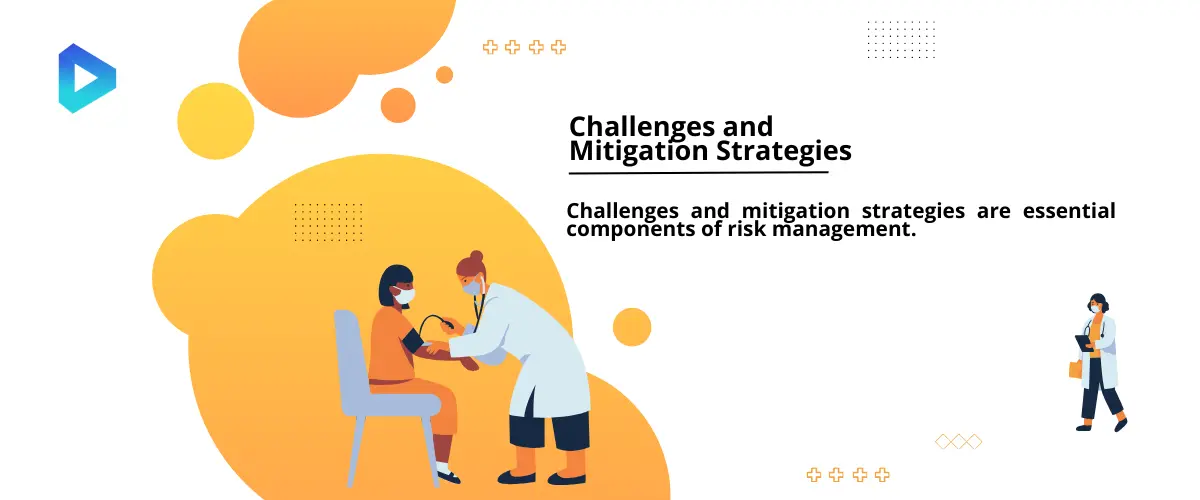
One common challenge in healthcare software development outsourcing is communication and language barriers. Different time zones, cultural contexts, and language proficiency can hinder effective communication. To address this challenge, it is important to establish clear communication channels and protocols from the beginning to ensure a thorough understanding of expectations and requirements. The use of project management tools, visual aids, and written documentation can help overcome language barriers.
Time zone differences can pose challenges in coordinating project activities and maintaining timely communication. To address this, it is crucial to establish overlapping working hours or designate specific hours for real-time collaboration. Utilizing project management tools and collaborative platforms that facilitate asynchronous communication can help manage projects across different time zones.
Data security and privacy are paramount in healthcare software development outsourcing. Healthcare organizations must ensure that their outsourcing partners follow stringent security protocols and comply with applicable regulations like HIPAA or GDPR. Secrecy clauses and non-disclosure agreements should be in place to safeguard sensitive patient data.
Cultural differences and varying expectations can impact communication and collaboration in outsourcing relationships. Building cultural awareness and understanding is crucial to effectively managing these differences. It creates a more collaborative and inclusive environment by dedicating time to understanding the outsourcing partner's culture, work practices, and communication styles.
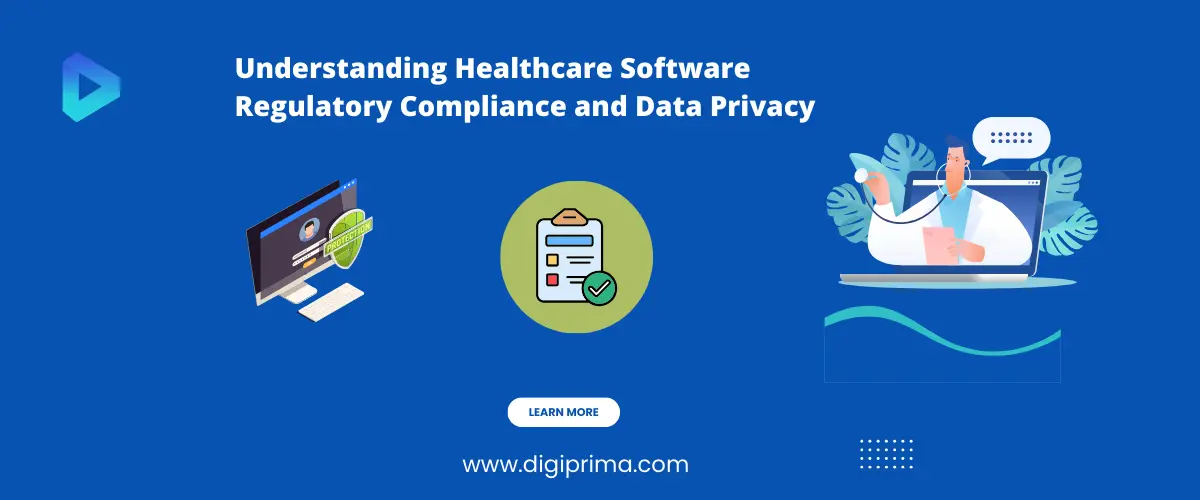
Compliance with healthcare regulations is paramount in healthcare software development outsourcing. Healthcare organizations must ensure that their outsourcing partners possess a comprehensive understanding of relevant regulations such as HIPAA or GDPR. The partner should have well-established processes and policies in place to guarantee compliance.
Securing sensitive patient data is a crucial consideration in healthcare software development outsourcing. Healthcare organizations must establish clear guidelines and contractual agreements with their outsourcing partners to safeguard the secrecy of patient information. This involves implementing robust data protection measures, including encryption, access controls, and secure storage practices.
To maintain data security and minimize weak points in healthcare software development outsourcing, regular security audits and risk assessments are essential. Healthcare organizations should regularly audit their outsourcing partners' security practices and infrastructure to ensure compliance with industry standards and regulations. This involves evaluating the effectiveness of data protection measures and identifying potential risks and weak points.
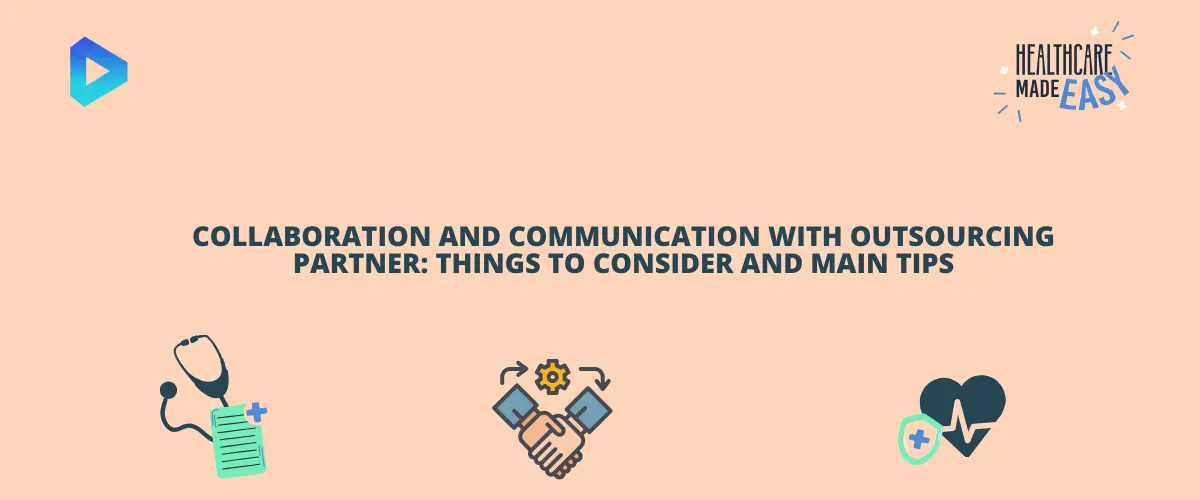
To ensure effective collaboration, it is crucial to establish clear communication channels and protocols. This includes identifying key communication tools such as email, project management platforms, or video conferencing to be used throughout the project. Additionally, establishing communication protocols, including response times, update frequency, and availability of key team members, is vital. By setting clear guidelines and making sure everyone is pulling in the same direction, you can streamline communication and minimize confusion and delays.
Regular project updates and progress tracking help maintain transparency and keep all stakeholders informed about the project's status. Scheduled check-ins, such as meetings or video conferences, provide an opportunity to discuss progress, achievements, challenges, and upcoming milestones. Sharing progress reports, including key outputs and milestones achieved, ensures that both the healthcare organization and outsourcing partner have a clear understanding of the project's progress. Regular updates foster collaboration, allow for timely adjustments, and build confidence in the project's trajectory.
Managing expectations and addressing concerns promptly is crucial for maintaining a productive and collaborative relationship. It's important to establish a culture of open communication where concerns, questions, and feedback are encouraged. Promptly addressing any concerns or issues that arise helps prevent escalation and ensures that the project stays on track. By actively managing expectations, both parties can align their goals and outcomes, mitigating potential conflicts and fostering a positive working relationship.
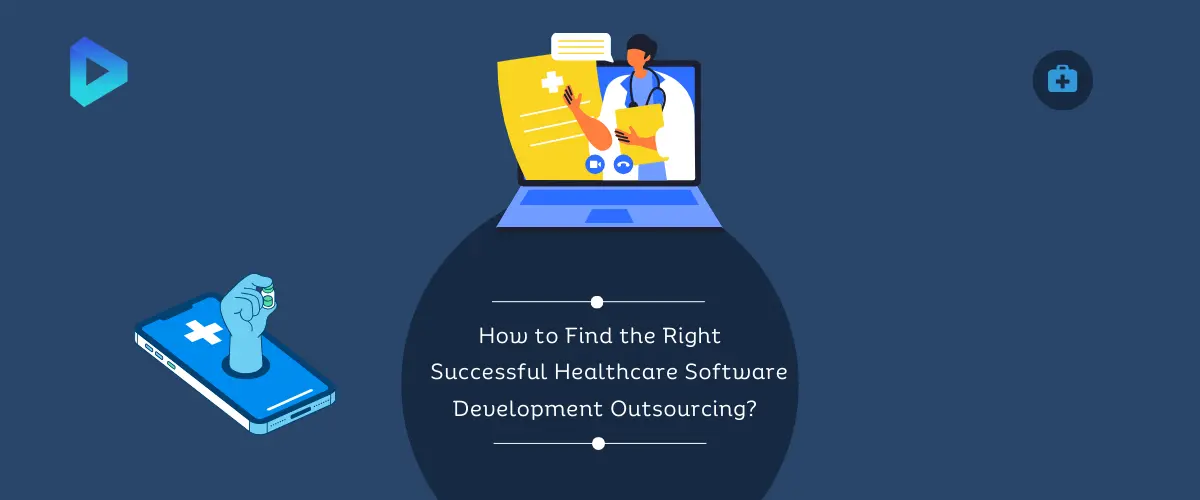
Clear and detailed project requirements are essential for successful outsourcing. Healthcare organizations should comprehensively describe their needs, goals, and expected outputs. This includes specifying functional and non-functional requirements, integration needs, compliance standards, and any specific design or usability preferences. By clearly defining requirements, both parties can align their understanding and expectations, reducing the risk of confusion and rework.
Effective project management relies on setting realistic timelines and milestones. Several factors must be considered, including the complexity of the project, the availability of resources, and potential challenges. By establishing achievable milestones and timelines, healthcare organizations and outsourcing partners can effectively manage expectations, track progress, and make informed decisions regarding resource allocation and project scheduling.
Effective project management and governance practices are crucial for ensuring successful outsourcing engagements. This involves appointing a dedicated project manager who acts as the main point of contact, facilitates communication, and ensures seamless coordination between the healthcare organization and the outsourcing partner. Establishing regular progress updates, frequent communication channels, and clear decision-making processes enables effective collaboration and issue resolution. Additionally, establishing governance mechanisms, such as regular project reviews and milestone sign-offs, ensures project alignment and adherence to quality standards.
Establishing strong, long-term partnerships and fostering trust between the healthcare organization and the outsourcing partner are crucial for successful software development outsourcing. This involves carefully selecting a partner that shares the organization's values, goals, and culture. Investing in relationship-building activities such as in-person meetings, team-building events, and knowledge-sharing sessions promotes collaboration, transparency, and trust. Long-term partnerships ensure consistency, effective knowledge transfer, and ongoing support and maintenance of the software solution.
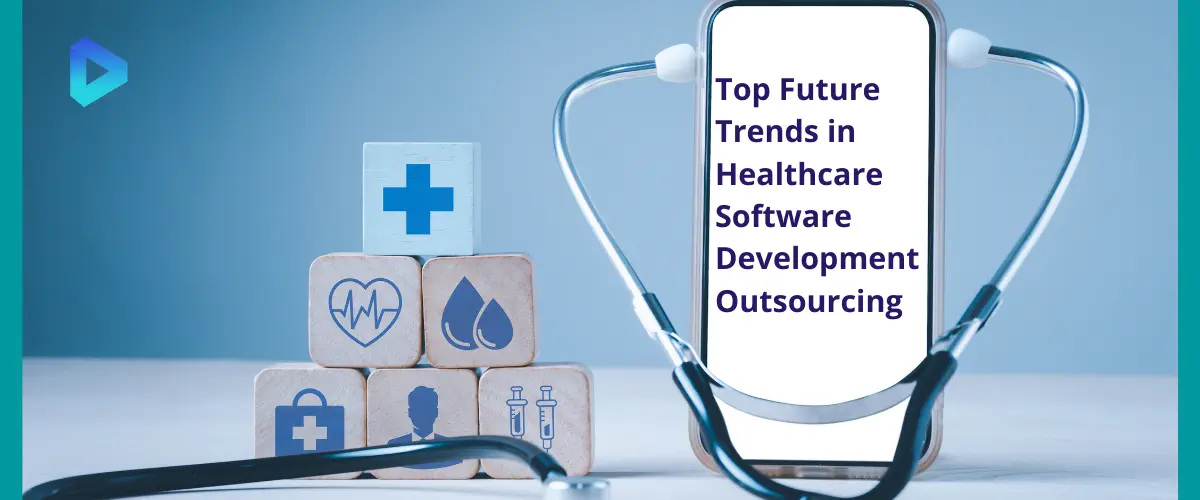
AI and machine learning have game-changing potential in healthcare. Outsourcing skilled workers can develop intelligent solutions for tasks like diagnosis, treatment recommendations, and patient assessment. Partnering with experts in AI and machine learning abroad enables healthcare organizations to leverage these advances.
Outsourcing companies can leverage the immense potential of IoT in healthcare. They can develop IoT-enabled devices and platforms that capture real-time patient health data, enabling remote patient management. These devices monitor vital signs, track medication adherence, and provide proactive health alerts. Outsourcing partners with IoT expertise can assist in designing secure and scalable solutions for remote patient monitoring and care management.
Blockchain technology offers a secure and decentralized approach to health data management. It ensures data integrity, secrecy, and tracking, making it ideal for healthcare applications such as health records management, compatibility, and secure data exchange. Outsourcing partners can utilize blockchain technology to create systems that improve data privacy, facilitate seamless health data exchange, and facilitate consent management. Working with outsourcing companies specializing in blockchain technology allows healthcare organizations to effectively address the challenges of implementing secure and interoperable health data systems.
Virtual and augmented reality have become popular in healthcare for training and simulation purposes. Outsourcing companies can develop immersive experiences that aid in medical education, surgical training, and patient rehabilitation. These technologies offer realistic simulations, interactive learning environments, and advanced visual representation techniques. Outsourcing partners with expertise in virtual and augmented reality can help healthcare organizations develop immersive training solutions that enhance learning outcomes and elevate patient care.
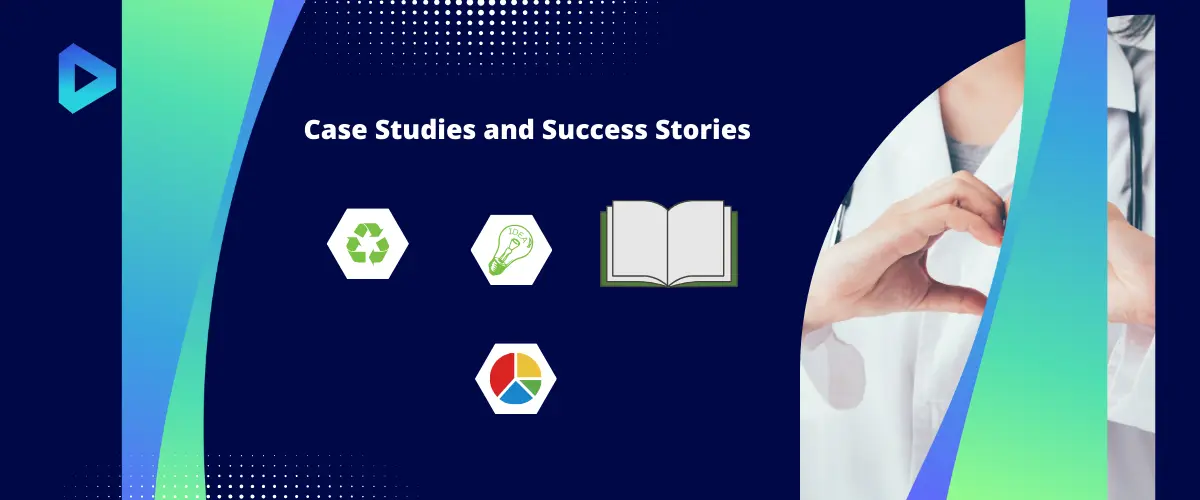
A healthcare organization successfully outsourced the development of a patient engagement mobile app to an outsourcing partner. The app enabled patients to access medical records, schedule appointments, receive personalized health recommendations, and communicate with healthcare providers. The outsourcing partner's expertise in mobile app development and healthcare domain knowledge led to a user-friendly and secure solution. The app's implementation enhanced patient engagement, improved healthcare service access, and increased patient satisfaction.
A healthcare organization successfully outsourced the development of a mobile app for patient engagement to an outsourcing partner. The app enabled patients to access medical records, schedule appointments, receive personalized health recommendations, and communicate with healthcare providers. The outsourcing partner's expertise in mobile app development and healthcare domain knowledge led to a user-friendly and secure solution. The app's implementation enhanced patient engagement, improved healthcare service access, and increased patient satisfaction.
Successful collaborations in healthcare software development outsourcing require clear communication, aligned goals, and effective project management. It is crucial to define project requirements and expectations upfront and maintain regular communication channels to ensure ongoing collaboration and transparency. Setting realistic timelines, milestones, and outputs helps manage expectations and track progress effectively.
Outsourcing healthcare software development provides numerous advantages, such as cost savings, access to specialized skills and expertise, quicker time-to-market, and flexibility in resource allocation and scalability. It allows healthcare organizations to focus on core competencies, optimize budgets, and leverage external knowledge and resources. However, to ensure the success of outsourcing engagements, it is essential to address factors such as clear communication, managing cultural differences, and ensuring data security and compliance.
Strategic partnerships play a vital role in successful healthcare software development and outsourcing. By selecting the right outsourcing partner, healthcare organizations can establish long-term collaborations based on trust, shared goals, and effective communication. Strong partnerships enable seamless project management, continuous support, and ongoing innovation. It is essential to cultivate relationships that promote knowledge exchange, transparency, and alignment of objectives.
Outsourcing in healthcare drives innovation and digital transformation. Outsourcing partners bring fresh perspectives, specialized skills, and technological expertise to healthcare organizations. By utilizing emerging technologies such as artificial intelligence, IoT, blockchain, and VR/AR, outsourcing can support healthcare organizations in driving innovation and transforming their operations. Outsourcing grants access to the latest advancements in healthcare software development, empowering organizations to stay competitive in a rapidly evolving industry.
Ans: Healthcare software development outsourcing involves partnering with external software development firms or service providers to create and maintain software solutions tailored to the healthcare industry. Healthcare organizations are opting to outsource the development of their software applications, platforms, or systems to specialized healthcare software development outsourcers instead of relying on an in-house team.
Ans: Healthcare groups prefer to outsource software development for several reasons. One of the top motivations is price savings. Outsourcing eliminates the need for full-size investments in recruiting, education, and retaining an in-residence improvement crew. It permits healthcare groups to get the right of entry to specialized skills and knowledge at a decreased value.
Ans: Healthcare software outsourcing can help organizations save costs in several ways. First, by outsourcing to countries with lower labor costs, organizations can benefit from lower development and operating costs. For example, countries like India and the Philippines have well-established software companies and skilled workforces that can provide cost-effective services.
Second, outsourcing allows organizations to avoid the costs associated with hiring and training internal development teams. By relying on outside vendors, organizations can benefit from the expertise and experience of these vendors without having to invest time in recruitment, onboarding, and training processes.
Ans: Healthcare software development outsourcing companies offer a wide range of services according to the specific needs of the healthcare industry. These services offered by healthcare software development outsourcing companies include custom software development, mobile and web application development, electronic health record (EHR) system design and integration, telehealth and remote patient care solutions, data analytics, business intelligence tools, as well as computing security and data privacy solutions. These companies specialize in creating software solutions that streamline healthcare, enhance patient care, improve data security, and increase efficiency in healthcare organizations.
Ans: Outsourcing can accelerate the development and deployment of healthcare solutions through various means. Firstly, outsourcing companies specialize in software development, employing dedicated teams with expertise in healthcare technology. Their streamlined development processes and experience in the healthcare domain enable them to work efficiently, reducing development time. Secondly, outsourcing provides access to additional resources and talent.
Ans: Selecting the right healthcare software development outsourcing partner requires careful consideration of several factors. Firstly, it is crucial to evaluate the partner's experience and domain knowledge in healthcare software development. Look for a provider who has a strong track record of successfully executing projects within the healthcare industry. Secondly, assess the outsourcing partner's technical capabilities and infrastructure.
Ans: Outsourcing healthcare software development offers organizations the opportunity to save costs through various means. One of the primary advantages lies in accessing countries with lower labor costs, enabling organizations to reduce development and working expenses significantly. Countries like India and the Philippines have well-established software development industries with skilled professionals who offer cost-effective services.
Outsourcing healthcare software development also saves costs by eliminating the expenses related to hiring and training in-house development teams. By relying on external vendors, organizations can benefit from the expertise and experience of these vendors without needing to make significant long-term investments in recruitment, onboarding, and continuous training.
Ans: Effective communication and collaboration with an outsourcing partner are key to successful project outcomes. To manage communication effectively, establish clear communication channels and protocols from the outset, including preferred communication tools and response times. Regular meetings and progress reports should be scheduled to keep everyone informed.
Ans: Ensuring data security and confidentiality in healthcare software development outsourcing is paramount. There are different types of steps you can take to accomplish this. Firstly, conduct thorough due diligence when selecting an outsourcing partner, assessing their security measures and compliance with relevant regulations.
Ans: Firstly, do very thorough due diligence when choosing an outsourcing partner, considering their security measures and compliance with relevant legislation. Use strong access control and encryption techniques to protect sensitive data while on vacation and on the move. Clearly define the data handling policy and secrecy agreement you have with the outsourcing partner. Regularly monitor their security practices and conduct vulnerability assessments to identify and address potential risks.
Ans: Many emerging products and technologies are shaping the outsourcing of healthcare software. One notable initiative is the integration of artificial intelligence (AI) and machine learning (ML) algorithms into healthcare solutions, which enables intelligent decision-making and predictive analytics through the Internet of Things (IoT). Applications are also gaining momentum, allowing remote disease monitoring and real-time data collection. Blockchain technology is being explored for the secure exchange of health information to ensure data integrity and secrecy.
Ans: Building a successful long-term outsourcing partnership with a provider requires several key steps. First, clearly define the project's goals, needs, and expectations. Establish open lines of communication and regular meetings to keep them consistent and address any concerns promptly. Establish a collaborative and transparent relationship based on mutual trust and respect.